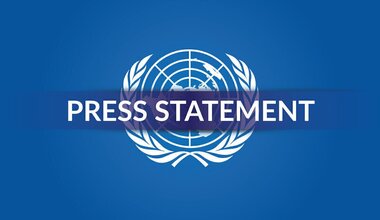Somalia’s long-term stability depends on professional, well-resourced security forces
Mogadishu - The long-term stability of Somalia hinges on well-resourced and professional security forces, top Somali Government officials have said.
Speaking at the end of a four-day National Security Conference organised by the Ministry of National Security, Somali Prime Minister Abdiweli Sheikh Ahmed appealed to the international community to help strengthen the security agencies of his government.
“The long-term stability of Somalia will ultimately rely on our own security forces and I want the international community to work with us to make our security agencies more effective,” he said.
At the opening of the conference on 20 April, Somali President Hassan Sheikh Mahamud underscored the importance of rebuilding professional Somali security forces. He said: “The culture of lawlessness, violence and self-interest that has plagued our country must be changed. The rebuilding of professional security forces to a level where they can protect Somalia must continue. There is a desperate shortage of resources across the whole security infrastructure. We have to address all of these issues if we are to achieve long lasting security and stability.”
The National Security Conference brought together representatives from all regions of Somalia, senior commanders of military and security forces and international partners with the aim of strengthening the security agencies of the government.
In his remarks, UN Assistance Mission in Somalia (UNSOM) senior security reform officer Eric Brandenburg noted that UNSOM was mandated to assist and facilitate the Federal Government of Somalia in building the capacity of its security institutions.
“Building efficient and effective security structures in a post conflict society is not a 5 or 10 kilometre race, but a marathon,” Mr. Brandenburg said. “UNSOM is here to work side-by-side with our Somali counterparts for the long run to build their security sector capacity and bring peace to the nation.”
The objective of the conference was to set out new ways for security agencies to achieve security and stability across Somalia. A number of recommendations - including the restructuring and re-organisation of security forces and the need for a specific strategy to ensure the youth do not turn to violence and extremism - were tabled at the meeting.
President Hassan Sheikh Mohamud said: “In 2016 Somalia will hold elections, but there is much to do before those elections can happen. This conference will identify challenges and now we have to overcome them. The Government will implement the outcome of this conference as well as continue implementing the resolutions we have made such as the Stabilisation Plan and the commitment to good governance.”
Speaking at the conference, AMISOM Deputy Force Commander Major General Geoffrey Muheesi said Somalia’s security has come a long way thanks to the Somali National Army supported by AMISOM.
The meeting also discussed issues of immigration as well as borders and points of access into the country. The Ministry of Immigration presented innovative solutions the government has put in place such as use of biometric identification cards and passports to ensure Somalia is safe against extremism through border protection and security.
Director of Immigration and Nationalisation General Abdullahi Mahamud Gaafo said: “The new ID card will revolutionize the way we manage public administration and other matters relating to local governance in order to minimize fraud and identity theft. We are optimistic this will improve national and international security by creating a system of storing personal information with a comprehensive database.”
ENDS
 UN
UN




